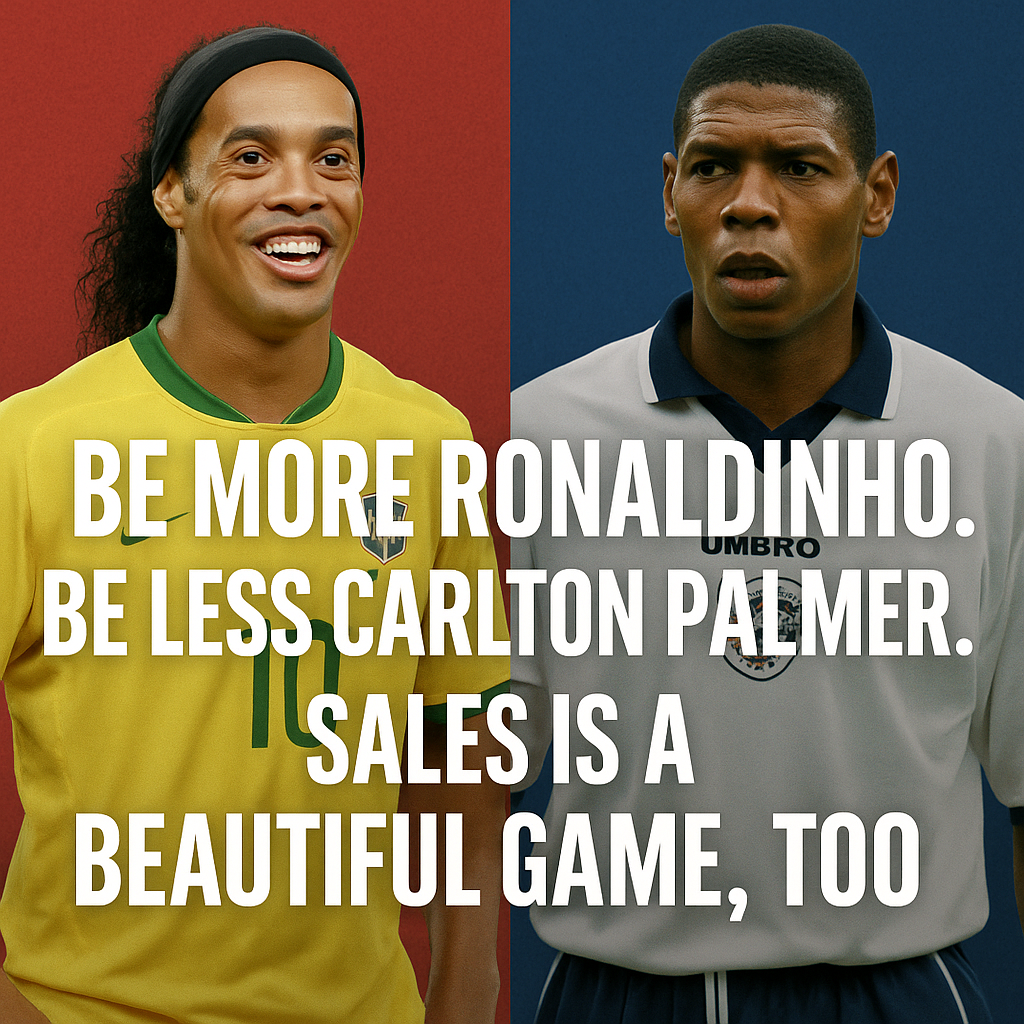Be More Ronaldinho. Be Less Carlton Palmer. Sales Is a Beautiful Game, Too.
I’ve always loved the mercurial players.
Part of the reason I ended up following Spurs as a kid was watching the likes of Chris Waddle, Glenn Hoddle, and later Paul Gascoigne — players who could turn a game with a moment of magic.
The ones who didn’t just follow the plan — they tore it up when they needed to.
So it’s no surprise that one of my favourite players of all time is Ronaldinho.
Skill, flair, vision — but more than anything, the sense of freedom every time he touched the ball.
Ronaldinho wasn’t trained to follow a script.
He learned to survive and shine on the futsal courts of Brazil:
tiny spaces, no set formations, just instinct and imagination.
Control the ball. Find space. Create something.
Mistakes weren’t punished. They were part of the game.
That’s how players like Ronaldinho developed not just technique, but intuition — the ability to invent solutions on the fly, to see openings nobody else could.
Meanwhile, across the Atlantic, youth soccer in the United States — and for a long time, England too — took a different approach.
More structure. More rules. More emphasis on sticking to the plan and minimizing errors.
Players were told where to move, when to pass, and how to follow the system.
It made teams organized, but it made players cautious.
In England, we produced Carlton Palmers — hardworking, honest, but not exactly magicians with the ball.
While Ronaldinho lifted World Cups and Champions Leagues, Carlton Palmer, by contrast, mostly lifted the occasional eyebrow.
“Carlton Palmer — the only footballer whose legs start running before his brain knows what’s happening.”
Creativity was seen as risky.
Flair was something to be tolerated, not nurtured.
It’s no accident that it took England decades (and a major rethink of its youth development system) to start producing players like Phil Foden, Jude Bellingham, and Cole Palmer — technically gifted, inventive, and confident enough to trust their instincts on the biggest stages.
And looking at sales coaching today, you have to wonder if we’re at risk of making the same old mistake again.
The Rise of AI — and the Risk of Over-Coaching
We have more tools than ever to “optimize” sales performance.
AI can listen to every call, score every meeting, and flag every deviation from the playbook.
Every word can be analyzed. Every moment can be benchmarked.
It’s powerful — but it’s also dangerous if we forget what made the best players (and salespeople) great in the first place.
If we train sales teams purely to minimize mistakes, follow scripts, and stick to rigid flows, we might create compliant reps.
But we won’t create closers.
Because real sales — like real football — happens in the spaces between the lines.
- It’s the rep who notices the hesitation in a buyer’s voice and gently pivots the conversation.
- It’s the AE who steps off the “next question” to explore a hidden need.
- It’s the ability to improvise when the customer doesn’t stick to the playbook (and they never do).
Mistakes aren’t the enemy of mastery.
They’re the price of it.
AI can — and should — be a brilliant teammate.
It can free us from admin, surface coaching insights, and speed up development.
But it should amplify human creativity, not replace it.
The Choice Ahead
In football, England eventually realized that you can’t just systemize your way to brilliance.
You have to nurture it.
You have to create environments where players trust their instincts, not just their instructions.
In sales, we have the same choice:
- Do we want Ronaldinhos — creative, instinctive, game-changers?
- Or Carlton Palmers — reliable, disciplined, but ultimately replaceable?
The future belongs to those who can read the play, not just follow the plan.
Sales is still a beautiful game.
Let’s coach it like one.






